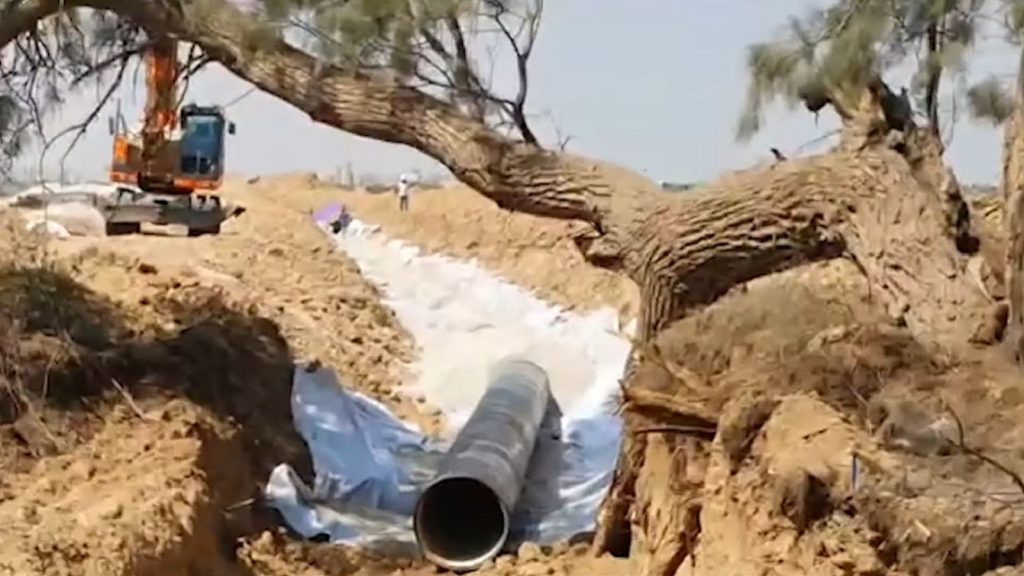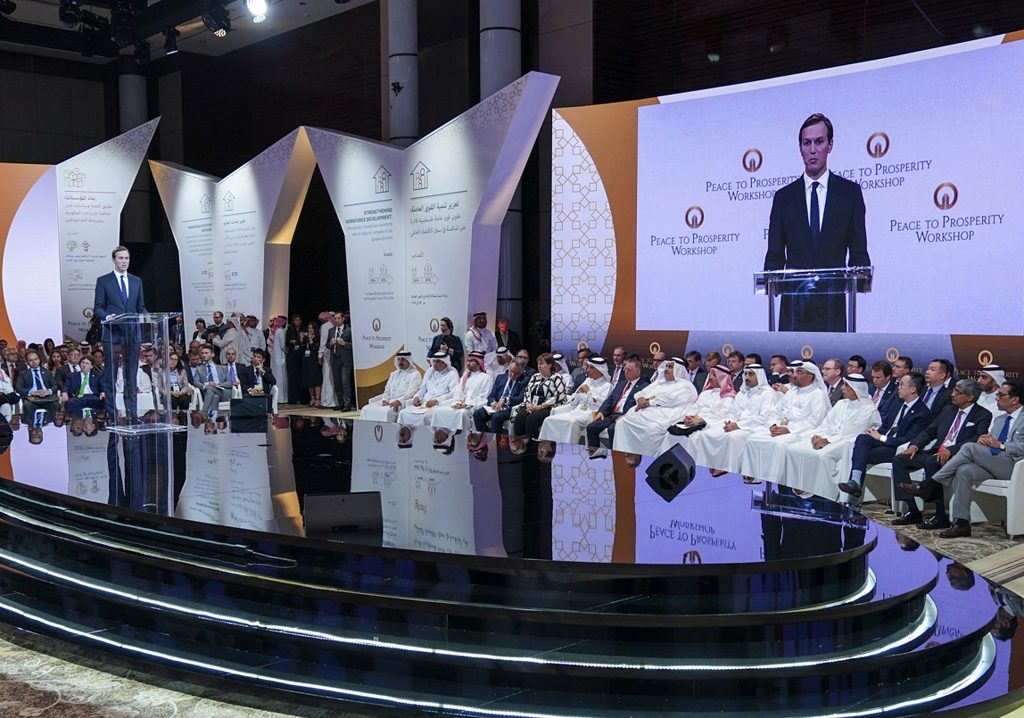Australia/Israel Review
Behind the News – August 2019
Aug 2, 2019 | AIJAC staff

Rockets and Terror
Weekly “March of Return” riots continued along the Gaza security fence, with Palestinians continuing to employ improvised explosive devices (IEDs), incendiary balloons and kites and attempting to damage the fence or infiltrate into Israel by armed militants. Only two rockets have been launched toward Israel in the past month, potentially in response to the accidental killing of a Hamas border guard trying to prevent an infiltration into Israel, for which the IDF apologised.
Meanwhile, a survey by the Jewish National Fund (JNF) reported a major jump in recent months in incendiary balloon and kite attacks on southern Israel and in fires sparked as result. According to the JNF, there have been 138 fires lit between the beginning of April and July 5 in the region bordering on the Gaza Strip, 120 of them in forests, destroying more than 180 acres. This is less destruction than in last year’s incendiary attacks thanks to improved preparedness by firefighting services.
In the West Bank, almost daily security incidents continue to occur, including Molotov cocktails, IEDs and one attempted car ramming.
Measures to relieve Gaza distress
With Israel’s approval, planning has begun on the construction of a 4000-square-metre field hospital for Gaza Strip residents to be built next to the Erez border crossing into Israel. The project is to be funded by Qatar and staffed by an American charity.
The hospital is reportedly the product of an understanding reached as part of Egyptian-brokered long-term truce talks between Hamas and Israel.
In addition, Israel has begun constructing a new water pipeline which will increase the amount of water it supplies to the Gaza Strip by 200%. Israel already exceeds the amount of water it is required to deliver to Gaza under the Oslo Accords, but Gaza is suffering from severe water shortages due to mismanagement of the local water catchment. The new pipeline is expected to be completed within a few months.
In other developments, there are reports that Israel has recently began discretely issuing permits to some 2,000 Gazans to allow them to work inside Israel.
Meanwhile, following Egypt’s decision in May 2018 to keep its border crossing with Gaza open after years of irregular operation, reports say up to 40,000 Gazans have taken advantage of the opportunity to emigrate. Most of those emigrating have applied for asylum in Europe via Turkey, claiming they faced persecution from Hamas.
Hamas’ Tunnels and Missiles
The IDF discovered another tunnel dug by Hamas from Gaza into Israel while constructing an underground security barrier along the border.
It was the 18th cross-border tunnel discovered since 2011 but appears to have been unused for some time.
Some analysts suggest Hamas has already abandoned this method of attack given Israeli countermeasures and is becoming more reliant on its rocket arsenal and drone program.
Hamas continues to develop its missile capabilities, test-firing missiles into the Mediterranean Sea at an increased rate, including 10 fired on July 3 alone.
PA raises pay-for-slay salaries despite financial crisis
The Palestinian Authority’s recently released budget reports have confirmed a 12% increase in payments to terrorist prisoners, according to Palestinian Media Watch.
From January to May 2019, the PA’s own reports show it has paid more than $94 million to Palestinian prisoners serving sentences in Israeli jails for attacking Israelis.
However, the Palestinian Finance Ministry denied salaries to prisoners had increased, calling the accusation “absolutely false and hypocritical”.
These so-called “pay-for-slay” salary increases come at a time of significant financial crisis for the PA, with foreign donors, including the United States and Australia, withholding funds over the PA’s continued financial support for terrorists and their families. Israel has also reduced tax revenues it transfers to the PA due to the “pay-for-slay” payments. In response, the PA has chosen to reject even partial tax transfers from Israel.
Bahrain conference participants persecuted

The Bahrain “Peace to Prosperity” conference
Despite warnings from Fatah that attendance at the Bahrain conference on Palestinian welfare would be considered treasonous, 13 businessmen, known as the Palestinian Business Network, participated in the US-sponsored Peace to Prosperity conference in late June.
Upon returning home to Hebron, businessman Saleh Abu Mayaleh was arrested by Palestinian Authority security forces. According to reports, he was released after an intervention by the US Embassy.
Other participants were forced into hiding, and one participant, Ashraf Ghanem, told reporters that upon his return to Hebron, his home was raided by PA security forces and his passport seized. He fled to the Israeli-controlled sector of Hebron.
Tanker Wars
Iranian forces have been targeting foreign merchant vessels through the Strait of Hormuz.
On July 19, a British-flagged oil tanker, the Stena Impero, was seized by Iranian naval forces. Iran said the ship was violating international maritime law, but Britain’s Foreign Secretary accused Iran of illegally seizing the ship in Omani waters.
A day earlier, Iran admitted to having seized a UAE-based Panamanian-flagged small tanker which had been missing for some days. Iran claimed the tanker was seized because it was smuggling Iranian oil.
A week earlier, on July 11, Iran naval forces had reportedly tried to capture a different British oil tanker, but a nearby British naval vessel warned the Iranians off.
The attacks on British tankers by Iranian forces is widely seen as retaliation for Britain’s seizure of the Iranian-owned Grace 1 supertanker near Gibraltar on July 5. Britain said the tanker was delivering oil to Syria in violation of EU sanctions.
British media also reported that an unmanned vessel packed with explosives was detected by a British navy ship headed towards the Gulf. The vessel was believed to be deployed by the Iran-backed Houthi rebel group.
Hezbollah role on Golan border
Following the Syrian regime’s re-establishment of control in southern regions closest to the Israeli border, there are reports that Hezbollah has begun directing Syrian forces along the sensitive Golan Heights.
Israeli media reports say Hezbollah has set up a “Southern Headquarters” in Syria, led by Lebanese commander Munir Ali Naim Shaiti, consisting of both Hezbollah and Syrian troops, and armed with powerful short-range rockets now being directed at Israel. The group has reportedly set up approximately 20 lookout positions on the Syrian Golan Heights facing Israeli territory, manned by Syrian soldiers often accompanied by Hezbollah members. These obtain intelligence on Israeli movements which are then relayed to Hezbollah headquarters in Lebanon.
This presence violates understandings that Israel reached with Russia, that the Iranian and Hezbollah presence in Syria would be kept a minimum of 80 kilometres from the Syrian border with Israel.
New evidence of Iranian nuclear violations
On July 11, Israeli sources revealed that International Atomic Energy Agency (IAEA) inspectors had found radioactive residue inside a warehouse in Teheran. Last year, Israel had publicly identified the warehouse as being a location where nuclear equipment never declared to IAEA inspectors was being hidden.
Meanwhile, a July 10 report by the US Institute for Science and International Security adduced evidence that Iran has not adhered to nuclear deal provisions that require it to redesign the Fordow uranium enrichment facility for civilian scientific purposes. Instead, the Fordow site had been expanded with a new area to “make gas centrifuge-related equipment… potentially in defiance of international restrictions and strategic trade controls,” according to the NGO.
Finally, Iranian citizen Behzad Pourghannad was extradited to the US in July after being charged in Germany over a foiled attempt to smuggle a large amount of carbon fibre into Iran from the US. US sanctions forbid Iran from importing carbon fibre, which is used in advanced uranium enrichment equipment.
Tags: Gaza, Hamas, Hezbollah, Iran, Israel, Palestinian Authority, Palestinians






